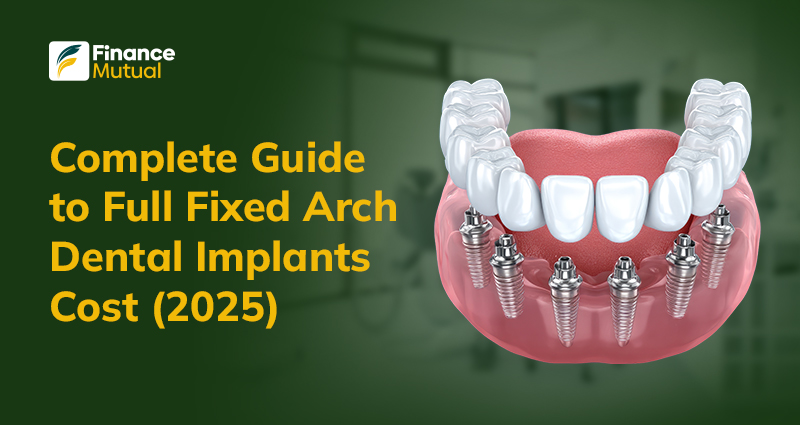
People often ask about the full fixed arch implant cost when exploring options to restore missing teeth. This treatment replaces an entire arch using a few well-placed implants that hold a permanent set of teeth. Compared to dentures, it provides stronger support and a more natural look. The price depends on several factors, including the type of implants, the materials used, and the method chosen by your dentist. Understanding these details makes it easier to plan both your treatment and your budget.
How Much Does a Full Set of Teeth Implants Cost?
The average cost of full mouth dental implants typically ranges from $25,000 to $60,000 for both arches. For a single arch, most patients pay between $12,000 and $30,000. These figures can vary greatly because no two cases are similar.
Factors that influence the price include:
- Experience of the surgeon
- Location of the dental clinic
- Type and number of implants placed
- Any additional procedures required
Average Cost of Full Mouth Dental Implants in the USA
Getting full mouth dental implants is a life-changing investment, but the price can vary significantly depending on where you live. Here are the state-specific averages that can help you plan better and make informed decisions about your treatment.
| State | Average cost |
| Alabama | $39,138 |
| Alaska | $45,005 |
| Arizona | $34,430 |
| Arkansas | $32,427 |
| California | $36,939 |
| Colorado | $34,382 |
| Connecticut | $24,059 |
| Delaware | $34,269 |
| District of Columbia | $35,895 |
| Florida | $56,554 |
| Georgia | $39,813 |
| Hawaii | $37,107 |
| Idaho | $54,431 |
| Illinois | $34,547 |
| Indiana | $39,600 |
| Iowa | $43,251 |
| Kansas | $43,668 |
| Kentucky | $43,775 |
| Louisiana | $38,988 |
| Maine | $44,402 |
| Maryland | $51,829 |
| Massachusetts | $54,675 |
| Michigan | $53,777 |
| Minnesota | $53,095 |
| Mississippi | $43,761 |
| Missouri | $45,625 |
| Montana | $44,254 |
| Nebraska | $43,479 |
| Nevada | $44,146 |
| New Hampshire | $44,737 |
| New Jersey | $55,101 |
| New Mexico | $53,624 |
| New York | $54,407 |
| North Carolina | $43,254 |
| North Dakota | $45,378 |
| Ohio | $55,878 |
| Oklahoma | $33,354 |
| Oregon | $47,480 |
| Pennsylvania | $54,824 |
| Rhode Island | $54,867 |
| South Carolina | $53,191 |
| South Dakota | $41,375 |
| Tennessee | $42,958 |
| Texas | $51,401 |
| Utah | $55,442 |
| Vermont | $48,398 |
| Virginia | $46,684 |
| Washington | $53,527 |
| West Virginia | $55,763 |
| Wisconsin | $53,827 |
| Wyoming | $42,883 |
Dentures, Bridges, or Implants: Which Works Best?
Tooth loss becomes increasingly common with age. According to the CDC, nearly 20% of adults aged 75 and older have lost all of their natural teeth. For those facing full or partial tooth loss, options include dentures, bridges, or dental implants—each with its own benefits, costs, and considerations.
| Treatment | What it is | Pros | Cons |
| Full dentures | Removable teeth (upper/lower) replace all teeth in an arch. | Lowest cost upfront; non-surgical (if no extractions needed or minimal ones); you can get them relatively quickly. | Less stable (can slip); less chewing force; bone under jaw tends to shrink over time; may need relines, replacements, comfort issues; possible speech or eating limitations. |
| Bridges | Use existing healthy teeth (or implants) on either side of a gap to “bridge” over missing tooth/teeth. | More stable than dentures; better chewing, feel more natural; good aesthetics; no full denture plate. | Requires strong neighboring teeth; those may need to be altered/drilled; maintenance to keep gums and supporting teeth healthy; over time, the bridge may need replacement; the cost per tooth can add up. |
| Implants / Implant-supported dentures / Implant bridges | Titanium (or sometimes zirconia) posts are fixed into the jawbone to act as roots; then crown(s), bridges, or dentures attach. | Best stability; preserves jaw bone; close to feeling like natural teeth; better chewing power; more durable long term; fewer adjustments over time. | High initial cost; surgical procedure; healing time; sometimes bone grafts or sinus lifts needed; more complex treatment plan; requires good oral health; maintenance needed. |
Comparing Costs: Dentures vs. Implant Dentures vs. Bridges
These are ballpark ranges. Actual cost for you depends on where you live (city, state), clinic/doctor’s fees, materials, how many teeth, and whether extractions, bone grafts, etc., are needed.
| Treatment | Approximate Cost |
| Cost of full dentures with extractions |
|
| Implant dentures cost |
|
| 4 tooth implant bridge cost |
|
Types of Dental Implants Cost
Choosing the right dental implant solution can feel overwhelming. There are several options depending on how many teeth you need to replace, the condition of your jawbone, and your budget. Let’s break it down clearly so you can make an informed choice.
Full Jaw Dental Implants Cost
When most or all teeth in a jaw are missing, full-arch solutions are recommended. These include the popular All-on-4 and All-on-6 methods.
- All-on-4 Implants: This method secures a full set of teeth on only four dental implants positioned in key areas of the jaw.
- Cost: Around $12,000–$25,000 per arch.
- Pros: Less invasive than placing an implant for every tooth, shorter recovery, natural look.
- Cost: Around $12,000–$25,000 per arch.
- All-on-6 Implants: Utilize six implants to support a full arch.
- Cost: Around $25,000–$35,000 per arch.
- Pros: Extra implants provide better stability, especially if your bone density is lower.
- Cost: Around $25,000–$35,000 per arch.
- Full Mouth Rehabilitation: If both upper and lower arches require replacement, costs can range from $30,000 to $ 90,000 or more, depending on the complexity, materials, and any preparatory procedures such as bone grafts or extractions.
Did you know?
In the U.S., more than 150 million people are missing at least one tooth, yet only about 1 million receive dental implant treatment each year. That means millions still live without the benefits of implants, often due to cost or access barriers.
Source: AAID
Cost of All-on-4 vs. All-on-6 Dental Implants Cost - Key Differences
When you're looking to replace a whole arch of teeth, you've got a couple of great options: All-on-4 or All-on-6 dental implants. Both of these give you a set of fixed teeth that feel totally natural, but they're a little different when it comes to how many implants are used, how stable they are, and, of course, the cost. Knowing these distinctions can help you understand which choice is the perfect fit for your jawbone, your wallet, and your long-term dental well-being.
| Feature | All-on-4 | All-on-6 |
| Number of Implants | 4 | 6 |
| Cost per Arch | $12,000–$25,000 | $25,000–$35,000 |
| Stability | Good | Stronger with extra support |
| Ideal for | Sufficient bone density | Patients with less bone density |
Upper Implants vs. Lower Implants
When considering dental implants, the location of the implants—upper or lower jaw—can significantly affect both cost and complexity. The table below breaks down the differences, including cost ranges, surgical considerations, and overall stability.
| Feature | All-on-4 | All-on-6 | Cost Range (per arch) | $12,000 – $35,000 (depending on type: All-on-4, All-on-6, material, prep work) | $10,000 – $30,000 (per arch, slightly lower in most cases) |
| Denture Implant Cost (upper arch) | Around $15,000 – $25,000 for an implant-supported denture | Around $12,000 – $22,000 for an implant-supported denture |
| Surgical Complexity | More challenging due to proximity to sinus cavities; may require sinus lift | Generally less complex; jawbone denser and easier to work with |
| Bone Density Considerations | The upper jawbone is softer; it may need more implants for stability | The lower jawbone is denser; fewer implants may suffice |
| Recovery & Healing | Slightly longer healing due to bone structure; more careful sinus monitoring | Usually faster healing; bone integrates implants more predictably |
| Stability & Longevity | Good stability with proper placement; slightly higher risk of implant failure if the bone is weak | Excellent stability; lower failure rates due to denser bone |
| Best Suited For | Patients needing upper dentures or full-arch replacement may need All-on-6 for extra support | Patients needing lower dentures or full-arch replacement; All-on-4 is often sufficient |
Cheapest Place to Get All-on-4 Dental Implants
Choosing where to get All-on-4 dental implants can make a big difference in cost and overall experience. The table below highlights some popular destinations—India, Mexico, the UK, Turkey, and Hungary—to help you compare costs and make an informed decision.
| Country | Cost per Arch (USD) | Highlights | India | $4,000 – $8,000 | High-quality care at a fraction of Western prices; many clinics offer all-inclusive packages. |
| Mexico | $4,250 – $7,500 | Affordable pricing with comprehensive packages; popular among dental tourists. |
| UK | $10,500 – $25,000 | Higher costs due to advanced technology and skilled professionals; insurance may offset. |
| Turkey | $3,000 – $6,500 | Budget-friendly options with inclusive packages; includes travel and accommodation. |
| Hungary | $3,000 – $12,500 | Competitive pricing with reputable clinics; quality care in major cities like Budapest. |
Does Insurance Cover the Full Set of Dental Implants Price?
Usually, dental insurance does not cover the total cost of dental implants — particularly for full-arch or complete set replacements. It is common for dental implants to be viewed as a cosmetic procedure, rather than being medically necessary, which limits dental insurance coverage.
Inexpensive Dental Implants for Seniors and Financing Options
Seniors looking for affordable dental implants have several budget-friendly options. Dental schools often provide high-quality care at reduced costs, since treatments are performed by supervised students under the guidance of experienced faculty dentists. Non-profit dental clinics and community health centers may also offer implants at lower fees and sometimes adjust costs based on income.
In addition to these resources, seniors can take advantage of FinanceMutual’s dental payment plans, which make it easier to spread the cost of treatment into manageable monthly installments. By combining these options, seniors can restore their smiles and confidence without carrying the burden of overwhelming upfront expenses.
| Financing Options | How It Works | Pros | Payment Plans | Dental clinics split the average price for implants into monthly payments. | Easy to budget, sometimes interest-free |
| HSA (Health Savings Account) | Pre-tax funds from your HSA cover implant expenses. | Reduces taxable income, flexible use |
| FSA (Flexible Spending Account) | Employer-based account for medical and dental costs. | Pre-tax savings lower out-of-pocket |
| Dental Clinic Financing | Practices partner with third-party lenders or offer in-house financing. | Convenient, designed for dental care |
| Credit Cards | Use medical credit cards or personal credit cards to pay for treatment. | Quick approval, some offer 0% APR promos |
| Personal Loans | A bank or online loan provides a lump sum for implants. | Fixed monthly payments, predictable terms |
Conclusion
When you search for “full arch dental implants near me,” you’re not just looking for a dental service—you’re taking the first step toward restoring both your smile and your confidence. Finding a trusted local provider matters because it ensures easier follow-ups, ongoing support, and a personalized approach that fits your specific needs.
Dental implants are more than a quick fix; they’re a long-term investment in your oral health, comfort, and quality of life. Unlike dentures or bridges, implants are designed to be durable and to preserve the natural structure of your jaw, making them a solution that pays off for years to come. And with FinanceMutual’s flexible payment plans, you don’t have to let cost hold you back—you can move forward with treatment while keeping your budget comfortable and predictable.
FAQs
1. How Much Does a Full Set of Dental Implants Cost?
The cost for a complete set of implants can range from $25,000 to $60,000 or more. The price will vary based on the number of implants placed, the type of prosthetic teeth, and any additional procedures that may be needed, like bone grafts.
2. Is the Cost of All-on-4 Dental Implants Lower Than All-on-6?
Yes, generally, All-on-4 is a more cost-effective solution than an All-on-6 because fewer implants are placed. An All-on-6 may provide extra stability that some patients may want. Your dentist will offer recommendations on what they feel is necessary for long-term success.
3. What Is the Average Price for Implants if I Only Need One or Two Teeth Replaced?
Single tooth dental implant costs between $3,000 - $5,000 per tooth, which includes the cost of the dental implant, abutment, and crown. Replacing one or two can be in the range of $6,000 - $10,000.
4. Are There Inexpensive Dental Implants for Seniors Covered by Insurance?
Dental insurance does not cover the entire cost of implants; however, some insurance plans may cover part of the costs, including extractions or crowns. Seniors seeking lower costs for implants often look to discount dental plans, financing, or dental schools to make implants more affordable.
5. What’s the Difference in Cost Between Upper Denture Implants and Lower Implants?
The lower implants can sometimes be less costly, since the bone of the lower jaw is usually denser, which can make the surgery easier than with upper implants. Upper implants may require bone grafting or sinus lifts, which can raise the price.
6. What Is the Full Implant Teeth Cost Compared to Removable Dentures?
Removable dentures are far less expensive, typically $1,000 to $3,000 per arch, while full implant-supported teeth may cost 10–20 times more. The higher investment in implants often pays off in comfort, function, and long-term durability.
7. Can I Reduce My Teeth Setting Cost With Insurance or Financing?
Dental insurance rarely covers the complete treatment cost of implants, but might cover part of the treatment, such as the extractions or crowns. Many clinics offer finance options to help spread out the cost of the dental implant over time.
8. How Much Do Upper Denture Implants Cost on Average?
Typically, upper denture implants are priced between $12,000 - $25,000. The cost depends on the number of implants you will need and if any additional steps, such as bone grafting or sinus lifts, are required. Your dentist will provide you with an estimate after they assess your mouth.




